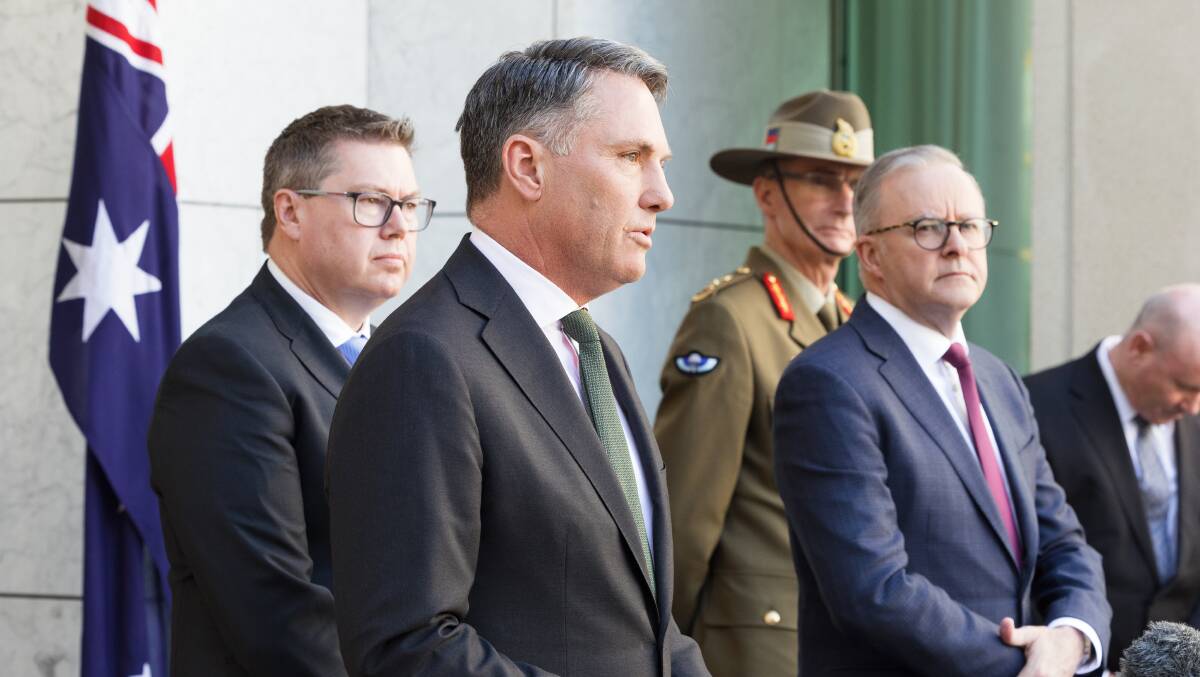
Labor has failed on defence. A year has passed since it received the Defence Strategic Review, and virtually nothing to quickly strengthen our armed services has happened.
Most likely, Labor has failed partly because Defence Minister Richard Marles has been unable to wade through the quagmire of our military establishment - the Department of Defence and the three armed services.
But under the Westminster system, the minister is responsible. Beyond him, the whole elected government of Anthony Albanese can be blamed, not least because defence funding isn't rising.
What is rising is the threat from China, whose military power is surging. If it attempts to conquer Taiwan - and it persistently threatens to do so - then that day is only getting closer. And so is the terrifying prospect of Chinese dominance of East Asia that would follow Taiwan's subjugation.
Since Albanese and Marles posed for cameras to accept the defence review on February 14, 2023, we have seen only a trickle of modest equipment purchases, mostly the usual re-announcements. On Friday the government said the air force would get three more prototype Ghost Bat drones, which means little for the immediate future. There have been no major orders for weapons that were not already in the pipeline.
We were supposed to get a quick decision on what to do with the navy's surface fleet. We're still waiting.
The year of failure began with failure, because the government responded to the review by deciding on no quick rise in the defence budget. Ignore its talk of modest rises years from now. Maybe they'll happen; maybe they won't. What counts is the here-and-now.
And the government also started the year of failure by deciding to publish a toned-down version of the review. For example, it responded to the most urgent recommendation, strengthening our northern bases, by saying it agreed only "in principle" - meaning, "well it's a nice idea, anyway."
Worse, Labor almost certainly decided a year ago to completely suppress some recommendations because they called for immediate spending increases. The review in its secret version cannot have failed to recommend expansion of the air force, the only part of our military that could be meaningfully reinforced in a hurry. Yet no such action appeared in the published version.
And before the year of failures were nine months of failure following the May 2022 election.
Some measures obviously needed to be taken then without waiting for a review. Strengthening the air force's six go-to-war bases up north and doing more to ensure their wartime fuel supply has been a screaming necessity for years.
Also, the government should have promptly ordered more aircraft of certain types that were already in service, most importantly tankers and surveillance planes.
All this failure followed clear pre-election indications from Labor that it understood the need to get moving.
"One of the problems I have is the little investment that's been made in short-term capability gaps that need to be addressed," Brendan O'Connor, Labor's then defence spokesperson, said a few weeks before the election.
He wanted extra firepower delivered within three to five years - that is, in 2025 to 2027. Well, we can now forget any possibility of that happening.
When Marles became the minister, he almost certainly had the same ambition as O'Connor. He just hasn't been able to achieve it.
Lack of money from Albanese and Treasurer Jim Chalmers has obviously been part of that. But all our experience with the department and armed services tells us that Marles has been struggling to get a quick change of course from an institution that does nothing quickly and rarely wants to shift direction.
"The Coalition wants the defence minister to succeed, because we'll have a more secure country," says opposition defence spokesperson Andrew Hastie, notably not calling for Marles to quit. "So, he needs to lead, he needs to lift his game, and he needs to pull his officials into line."
But before Labor failed, the Coalition failed. In 2021, Peter Dutton took over as the Coalition's sixth (!) defence minister, raising hopes that Scott Morrison's appointment of a heavyweight would get something changed in the portfolio.
But the defence establishment captured Dutton easily enough. After eight months he was mouthing army talking points to justify buying incredibly costly ground equipment that had little to do with the maritime and air war we feared.
Failure piled on failure piled on failure.
Meanwhile, the Taipan helicopter scandal gets worse and worse. After taking army advice in September to promptly get rid of the Taipans, Marles told us this week that delivery of 40 Black Hawk replacements would not be completed until 2029.
The Taipan helicopter scandal gets worse and worse. After taking army advice in September to promptly get rid of the Taipans, Marles told us this week that delivery of 40 Black Hawk replacements would not be completed until 2029.
So the disposal decision meant the army would do without its full battlefield air transport capability for six years - during which at least 12 other countries using the NH90 type, of which the Taipan is a version, will notably keep operating it.
What kind of military service deprives itself of a capability like that? How can a minister agree to such a recommendation?
Note that safety does not come into this. There was a fatal crash in July, but we know the lost aircraft was not at fault.
As for the outrageous decision to scrap the Taipans instead of donating them to Ukraine, retired Australian defence people have now offered to put disassembled ones back together for free. How embarrassing for the army.
Actually, army technicians who used to maintain Taipans could be doing the job, anyway. We have only three Black Hawks so far, so those people are not busy.
- Bradley Perrett was based in Beijing as a journalist from 2004 to 2020.


